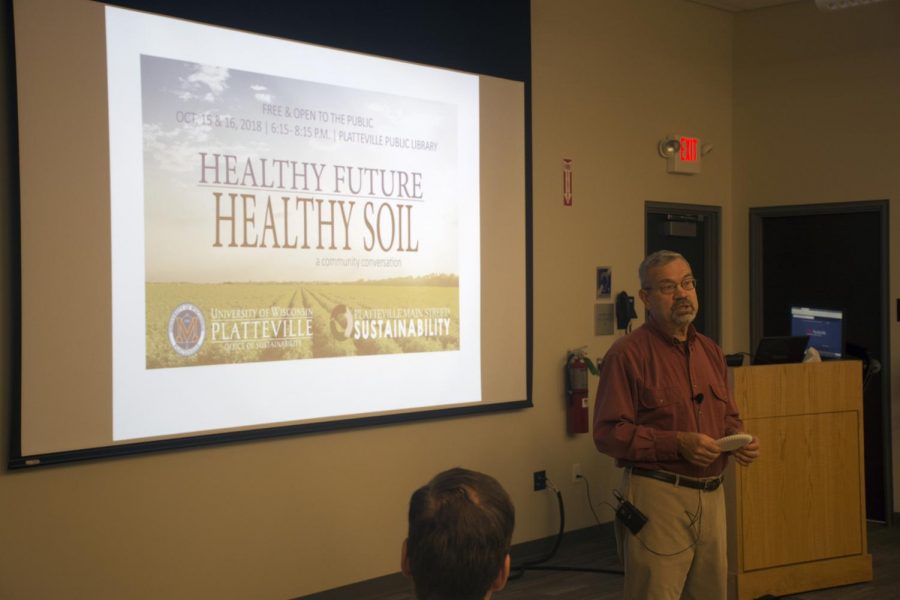New forms of sustainability lead to healthier future
Community leaders held a public seminar on soil management, led by Gary Munson, a representative of the Platteville Main Street Sustainability Committee. The seminar covered the effects of poor soil management, and ways to improve soil health.
The seminar showed that, in 2015 alone, about 1.7 billion tons of topsoil was lost due to the unhealthy practices used by many modern farmers. This loss of arable soil is caused in part by long-term monoculture, commonly seen in large corporate farms.
Munson then introduced the crowd to Brown’s Ranch, a farm that utilizes the natural growth patterns of plants and animals to build more sustainable and healthy products. Their goal is to regenerate the beneficial bacteria and fungal threads that enrich the soil by using no-till methods of planting, as well as planting complementary flora together. Similar to the Three Sisters Garden found behind McGregor Hall, Brown’s plants help each other by utilizing and regenerating different resources in the soil, as well as pushing harmful weeds out of the area.
Brown’s Ranch is a great example of big picture moves toward sustainability, but Munson also mentioned how locals in the community have been working toward creating healthier soil. For example, the Sinsinawa Mound Collaborative Farm is offering land for rent to use in organic farming and has experts on staff to assist farmers in using healthy growth methods. Jeff Jackson, from the Southwest Badger Resource Conservation and Development Council, also spoke about how his organization is helping the community.
“We investigate the effect that various invasive species can have on the soil health of a region. We also promote the use of cover crops when planting, as they reduce erosion, maintain the nutrients in the soil and help fend off invasive plants,” Jackson said.
Amy Seeboth-Wilson from the Office of Sustainability at UW-Platteville briefly spoke on how the University is promoting healthier soil. She spoke on how the University is testing no-mow areas on campus using native prairie plants and grasses to cut down on the use of lawn mowers and the damage that they can cause. She also spoke about the ornamental beds and edible gardens seen around campus using different native plants to enrich the soil and create a healthier on-campus environment.
Munson went on to note how the Main Street Program itself was helping create healthier soil.
“We’ve been promoting recycling in schools and parks, putting signs on garbage cans to make people think about what exactly they’re sending to the landfill,” Munson said.
He went on to talk about how, in collaboration with the high school FFA, the Main Street program sends a tomato plant home with every sixth-grade student every year. Along with that he promoted the use of the community garden in town, as well as the many examples of residents composting in their backyards.
“Something as simple as a gift of a tomato plant can prompt someone to build a beautiful garden. We just want to help with that first step,” Munson said.
Platteville is making progress towards a healthier living ideal, starting with our soil.




